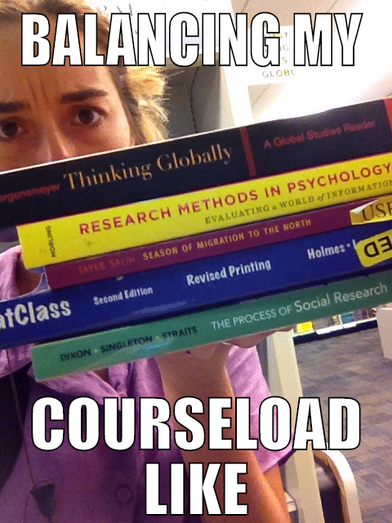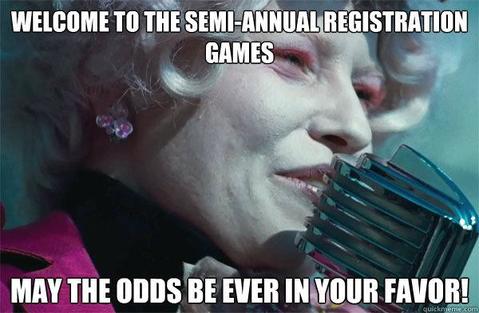This is Harder Than I Expected
As a transfer student you have had some experience with college-level coursework, However, many transfer students find that the pace and rigor of courses at UCSB surprise them and it requires them to really step up their game. Here's some tools to take your academic game to the next level:
|
Balancing Everything on Your Plate
The quarter system moves fast. For each of your classes, you will likely cover in 10 weeks the amount of material that you would have covered over the course of a whole year in high school. On your first day of class you will get your syllabus with the readings, assignments, and exams that you will have throughout the term. There is no warm up period--work begins on Day 1. Before you know it, problem sets will pile up, midterms will creep up on you, and papers will be due. The accelerated pace, increased rigor, and looming deadlines requires you to be consistent with studying and use your time efficiently to be able to get it all done.
Here are some tips to tackle all that you have to do with greater ease:
|
- Make time for breaks! On a good day, most students have the capacity for 45 minutes of work before their attention and concentration start to wander. On a tougher day, you might need to take breaks more often.
- Do the tasks that need more of your brain power earlier in the day when your energy is highest. If you try to do a difficult task when you are tired, you will likely take longer and it will be more challenging to complete the task when you are not operating on a full battery.
Running the Gauntlet: Getting into a Major
Transfer students often find that they are trying to get into their desired major within the first term that they arrive on campus. Getting into a major is hard but it can feel all that more challenging on a tight timeline! Sometimes it can feel like the odds are stacked against you.
Creating a short-term and long-term game plan and learning to balance your academic load, especially with taking upper division classes rather quickly upon your arrival, often requires some guidance. The Transfer Center has academic advisors who are specifically designated to help transfer students figure out a plan A as well as back up plans for finding a major. Make an appointment with an academic advisor and be on the lookout for workshops that the TSC offers that are geared towards students who are either wanting or needing to change their major direction. |
Preparing For Pass Times“Pass times”---the opportunity to vie for coveted seats in classes that everyone else is also trying to get into. It is inevitable that at some point you will likely not be able to register for a class that you had hoped to get into. The thought of not getting the class you need or want during registration can be very stressful. Here are some ways to make this process feel more manageable:
|
- Have a back-up plan. As the Rolling Stones once said “you can’t always get what you want”. So, that means you need to have some viable alternative classes that you want to take. Preparing for plans B, C, D, etc. will make registration easier.
- Be open to exploring different areas of study. Some students know from the start exactly what major they want to pursue and they end up sticking with it throughout their time at UCSB. However, more often than not, students will develop new interest and find their skill in areas that they might not have initially considered. So, make sure to take the opportunity to try out classes that just sound fascinating. You may be pleasantly surprised by what gets sparked in you and what amazing new things you can learn.
Proudly powered by Weebly




